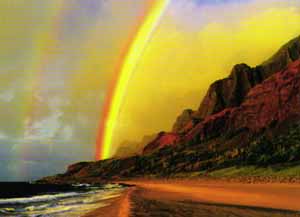

The Huna Path To Success & Prosperity
a workshop by Serge Kahili King
This workshop is full of very practical ideas and techniques for making your dreams come true, using the wisdom of Huna to strengthen your powers of mind, body and spirit.
Huna is a very ancient, pragmatic philosophy that grew out of an exceptionally keen observation of life by Polynesian masters, or kahunas, of esoteric knowledge.
Huna wisdom may be applied to anything, but it seems particularly well suited to accomplishing goals, achieving success, and turning dreams into deeds.
The nature of Polynesian language and mode of thought enabled those ancient masters to condense this philosphy into seven principles of clear and profound insight.
IKE is the Hawaiian word that represents the first principle, translated into English as "The world is what you think it is." What this means in terms of achievement is that in order to manifest what you want the most important factor is belief. Not just wishful thinking or intellectual opinion, but deep-down, rock-solid, unquestioned knowing. Anything less will produce results that are less, and this is why so many people get mixed results when they set out to manifest a dream.
KALA, the second principle, says that "There are no limits." In practical terms, this is a reminder that the universe is infinite, that anything is possible if you can figure out how to do it, and that everything you do influences the world around you. KALA has additional meanings of forgiving and releasing, indicating the importance of removing guilts, resentments and tensions that interfere with the free flow of energy toward your objective.
MAKIA means that "Energy flows where attention goes." Whatever you give your attention to is attracted to you, and the more focused your attention is, the stronger the attraction. The catch is, the attraction occurs whether your attention is positive or negative. The practical use of this principle involves something that many people find extremely difficult: defining your dream and clarifying your goals.
MANAWA says that "Now is the moment of power." Remembering past inadequacies will either keep you from moving ahead or reinforce the behavior that led to them; worrying about future failures will also either keep you from moving ahead or reinforce the behavior that will lead to them. Dreams can only be manifested in the here and now by acting in the here and now. You cannot do anything yesterday, and you cannot do anything tomorrow. Here is where it's at.
ALOHA is a principle that says "To love is to be happy with." In terms of manifesting it means two things. First, the more you are at peace with what you presently have, the easier it will be to change it. Second, the more you love your dream - the more it excites you - the easier it will be to manifest it. Many people have dreams that are born out of fear. They want to manifest prosperity because they are afraid of poverty, or they want to manifest peace because they are afraid of war. This fifth principle indicates that the best way to manifest prosperity is to love prosperity, and the best way to manifest peace is to love peace.
MANA is the sixth principle and it says that "All power comes from within." It tells us that there is no power outside of us - no person, being, object or circumstance - that has any power over us. By our own decision and belief we can act like others have more power over our life than we do, but the power to do that comes from within also. God (or the Universe, or Infinite Intelligence, or whatever name you prefer) doesn't act upon us, but through us. If you have a dream, says this principle, you have the power to make it come true. Of course, you also have the power to make it difficult, or easy.
PONO, the last principle, says that "Effectiveness is the measure of truth." What matters is what works, and the means determines the end. If you want joyful results from manifesting your dream, then you will have to use joyful means. This principle also says that if one technique doesn't work then try another, and if one plan doesn't work then change plans. It is the end result that counts, not the result of one technique or plan. In Huna we use many techniques from many sources, because this is a system of ideas, not techniques. If it works, it's Huna.
For any further questions use the contact information below.
[Top of page]
Copyright 2002 Hunaworks
P.O. Box 223009, Princeville HI 96722
tel-fax 808-827-8383, huna@huna.org